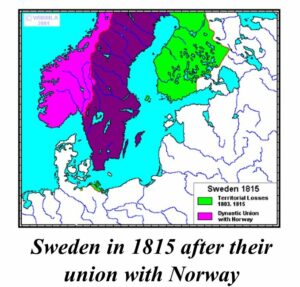
Would you believe that Sweden hasn’t been in a war since1818?
This is an amazing story, which I think this is due to the Napoleonic wars.
Background
In February 1808, Russia occupied Finland, while at the same time the Swedish King, Gustav III, refused to block British trade in the Baltic. This led to a coup that forced King Gustav to abdicate in favour of his uncle, King Karl XIII who become King. This was not a good solution as he was chronically ill and, yes, childless, he had no descendants! The result was that they found a Danish prince, Christian August of Augustenborg, and named him the heir.
But he quickly died! Now Sweden needed another heir!
What happened next?
Something weird happened. A member of the Swedish Parliament then proposed Jean Bernadotte, one of Napoleon’s Marshalls.
Who, you ask, so did the parliament!
Now this is the interesting bit. He was a French Catholic, who after joining up at 17, had climbed the ranks to eventually be appointed a Marshall of France by Napoleon. Then he married Napoleon’s former fiancée, Désirée Clary, whose sister was married to Napoleon’s brother, Joseph. He couldn’t have been closer to Napoleon.
Initially the Swedish Parliament thought the idea mad, while Napoleon thought it bizarre. However, Marshal Bernadotte was well known and popular in Sweden, due to his time as governor of both the Hanseatic cities and Hanover, where he had shown extreme kindness to Swedish prisoners.
Eventually, in 1810 the Swedish Parliament decided to accept him, hoping he would protect them from France’s ambitions.
What happened next?
Now, he was a very realistic man, he believed Napoleon’s days were numbered, so he accepted the Swedish Parliament’s request to be the heir. He moved to Sweden, but his wife didn’t, she didn’t fancy leaving her life and friends in Paris!
The King adopted him as his son, he took the name, Karl Johan, and due to the King’s ill health, he basically ran the country.
Did he back France?
No, once there he allied Sweden with Russia and Great Britain. This did not impress Napoleon who responded by occupying Swedish territory in northern Germany and Poland. This meant that Bernadotte, now Karl Johan, led Swedish troops against the French army, and in October 1813, he won several battles!
Union with Norway
 At this time Norway was in a union with Denmark, but the newly named Karl Johan felt it should be part of Sweden. Therefore, he set about persuading Denmark to concede Norway to Sweden.
At this time Norway was in a union with Denmark, but the newly named Karl Johan felt it should be part of Sweden. Therefore, he set about persuading Denmark to concede Norway to Sweden.
He achieved this; however, the Norwegians didn’t like it, so declared themselves independent. Now, he was a very special guy, he negotiated, he was good, as in the end they agreed on two kingdoms with one King, him!
Then in 1818 the old King finally died; Bernadotte now became King Karl XIV Johan. Once King, he announced Sweden’s policy of neutrality, it worked and has kept Sweden out of wars ever since.
Why?
I think that as a soldier he had seen the horrors of war and decided that with a strong army he could move Sweden to neutrality, with such a policy.
What an amazing man? A Catholic Frenchman, without noble blood, who became the King of not one but two Protestant countries, Sweden and Norway!
That neutral policy has remained ever since, however, the point to remember is that all along they have kept a strong well-equipped army.
Isn’t History Interesting?
10 questions to discuss:
- What historical event in 1808 ultimately led to Sweden’s policy of neutrality?
- How did Jean Bernadotte, a French military leader, become the heir to the Swedish throne?
- Why did Bernadotte, now known as Karl Johan, choose to side with Russia and Great Britain against Napoleon?
- How did Norway become part of a union with Sweden under Karl Johan?
- What key decision did Karl Johan make as King that has shaped Sweden’s foreign policy for centuries?
- Why do you think Karl Johan, having witnessed the horrors of war, opted for neutrality for Sweden?
- How has Sweden maintained its neutrality while still possessing a strong military?
- Do you think Sweden’s neutral stance has been beneficial for the country? Why or why not?
- Can you identify any potential challenges or limitations associated with maintaining neutrality in today’s world?
- Compare and contrast Sweden’s approach to neutrality with that of other historically neutral countries.
For more information:
http://realscandinavia.com/jean-bernadotte-the-french-soldier-who-became-king-of-sweden/

